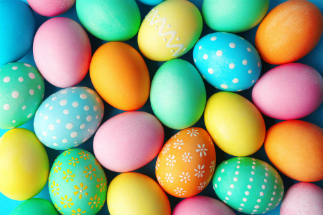We ask you, urgently: don't scroll past this
Dear readers, Catholic Online was de-platformed by Shopify for our pro-life beliefs. They shut down our Catholic Online, Catholic Online School, Prayer Candles, and Catholic Online Learning Resources essential faith tools serving over 1.4 million students and millions of families worldwide. Our founders, now in their 70's, just gave their entire life savings to protect this mission. But fewer than 2% of readers donate. If everyone gave just $5, the cost of a coffee, we could rebuild stronger and keep Catholic education free for all. Stand with us in faith. Thank you.Help Now >
Are Easter eggs pagan?
Easter eggs are a traditional part of modern Easter celebrations, but their origins are shrouded in history, raising questions about their use in Christian celebrations. There is worry they are symbols of paganism. Is this true?

Are Easter eggs a pagan symbol?
Highlights
Catholic Online (https://www.catholic.org)
4/8/2023 (2 years ago)
Published in Lent / Easter
LOS ANGELES, CA (California Network) - The Easter egg is a beautiful and fun tradition of the season, often celebrated by children who paint and hunt them. The egg has long been seen as a symbol of fertility and life. This view is virtually universal and ancient. As such, eggs have been important symbols in other religious traditions, and not just in Christianity.Ă‚Â
Since Christianity was heavily influenced by Roman paganism, which it supplanted, many have accused the egg of being a pagan symbol. Jehovah's Witnesses and atheists are fond of pointing this out to Christians, and arguing that Christians should eschew the egg for that reason.Ă‚Â
The good news is, the Easter egg in Christian tradition has a much humbler origin, and nothing to do with ancient pagan practices.Ă‚Â
The Easter egg as a symbol of the season dates back to Medieval Europe and the Lenten practices of that time. In Medieval Europe, people were divided by class, the two most numerous were peasants and serfs. Serfs were tied to the land, and lived as virtual slaves to their lords. In exchange for their life of servitude, they were given enough food to sustain themselves. Serfs were often afforded small gardens they could use to supplement their diets. Peasants were traditionally more free, and some became prosperous, a sort of primitive middle-class in medieval society. As such, they had to fend for themselves, but often tended small herds or flocks which could include chickens.Ă‚Â
Chickens were a popular source of protein for medieval people. They required only a modicum of space and a little feed. In return they provided eggs and meat which often served as the primary source of protein for these people. Hunting was often highly restricted and the feudal lord often had rights to the choicest cuts. This left eggs as a ready source of protein for both peasants and humble serfs.Ă‚Â
Lenten observations of the medieval period were more strict than they are today. Specifically, people refrained from all meat and dairy products during the entire 40 days of Lent, and this included eggs. As a result, many eggs were lost during the early part of the season.Ă‚Â
Towards the end of Lent however, eggs could be harvested and hard-boiled to preserve them long enough to keep until Easter. On Easter, Lenten fasts would be broken and the most common treat was usually an egg. As a result, the egg became a symbol of the holiday for the common people.Ă‚Â
The symbolism of the egg as a sign of new life would not have been lost on Medieval people. In fact, as the practice of taking eggs for food was stopped during Lent, the season was likely a time when eggs were allowed to be fertilized and hatched, increasing the size of flocks. And Easter would also be a good time to cull the older, less producing hens from the flock and taking their meat.Ă‚Â
The practice of painting and hunting the eggs developed much later. There is today an extensive mythology surrounding egg painting and hunting and other practices associated with the eggs. Suffice to say,Ă‚Â such traditions are highly varied across cultures.Ă‚Â
The good news is, the Easter egg in modern tradition does not come from paganism as popularly believed. It was a common way for people to break their strict Lenten fasts, and as such became a prominent symbol of the season.Ă‚Â
---
'Help Give every Student and Teacher FREE resources for a world-class Moral Catholic Education'
Copyright 2021 - Distributed by Catholic Online
Join the Movement
When you sign up below, you don't just join an email list - you're joining an entire movement for Free world class Catholic education.
A Lenten Message from Sister Catherine - Please Watch
- Easter / Lent
- 5 Lenten Prayers
- Ash Wednesday
- 7 Morning Prayers
- Mysteries of the Rosary
- Litany of the Bl. Virgin Mary
- Popular Saints
- Popular Prayers
- Female Saints
- Saint Feast Days by Month
- Stations of the Cross
- St. Francis of Assisi
- St. Michael the Archangel
- The Apostles' Creed
- Unfailing Prayer to St. Anthony
- Pray the Rosary
![]()
Copyright 2026 Catholic Online. All materials contained on this site, whether written, audible or visual are the exclusive property of Catholic Online and are protected under U.S. and International copyright laws, © Copyright 2026 Catholic Online. Any unauthorized use, without prior written consent of Catholic Online is strictly forbidden and prohibited.
Catholic Online is a Project of Your Catholic Voice Foundation, a Not-for-Profit Corporation. Your Catholic Voice Foundation has been granted a recognition of tax exemption under Section 501(c)(3) of the Internal Revenue Code. Federal Tax Identification Number: 81-0596847. Your gift is tax-deductible as allowed by law.








